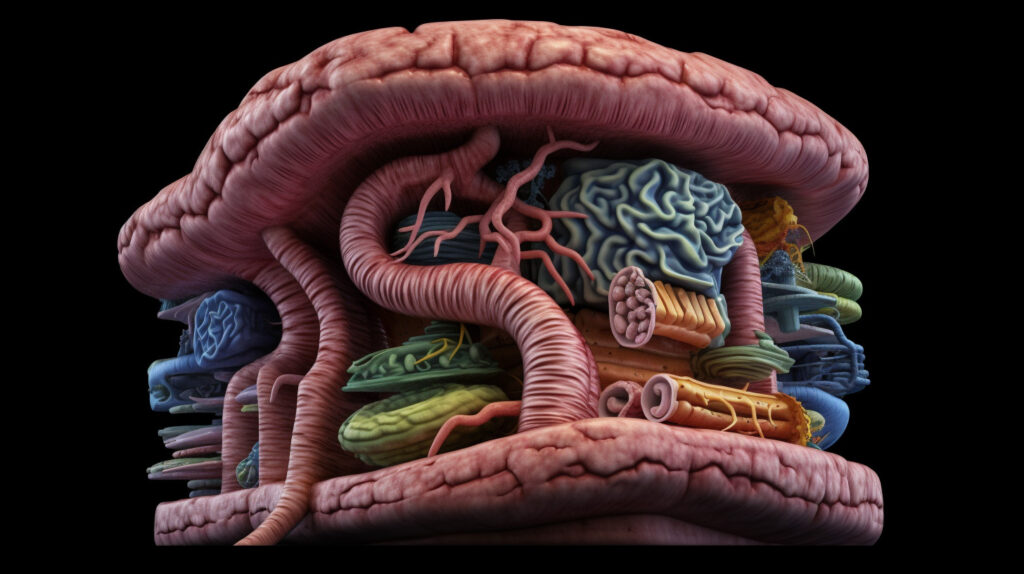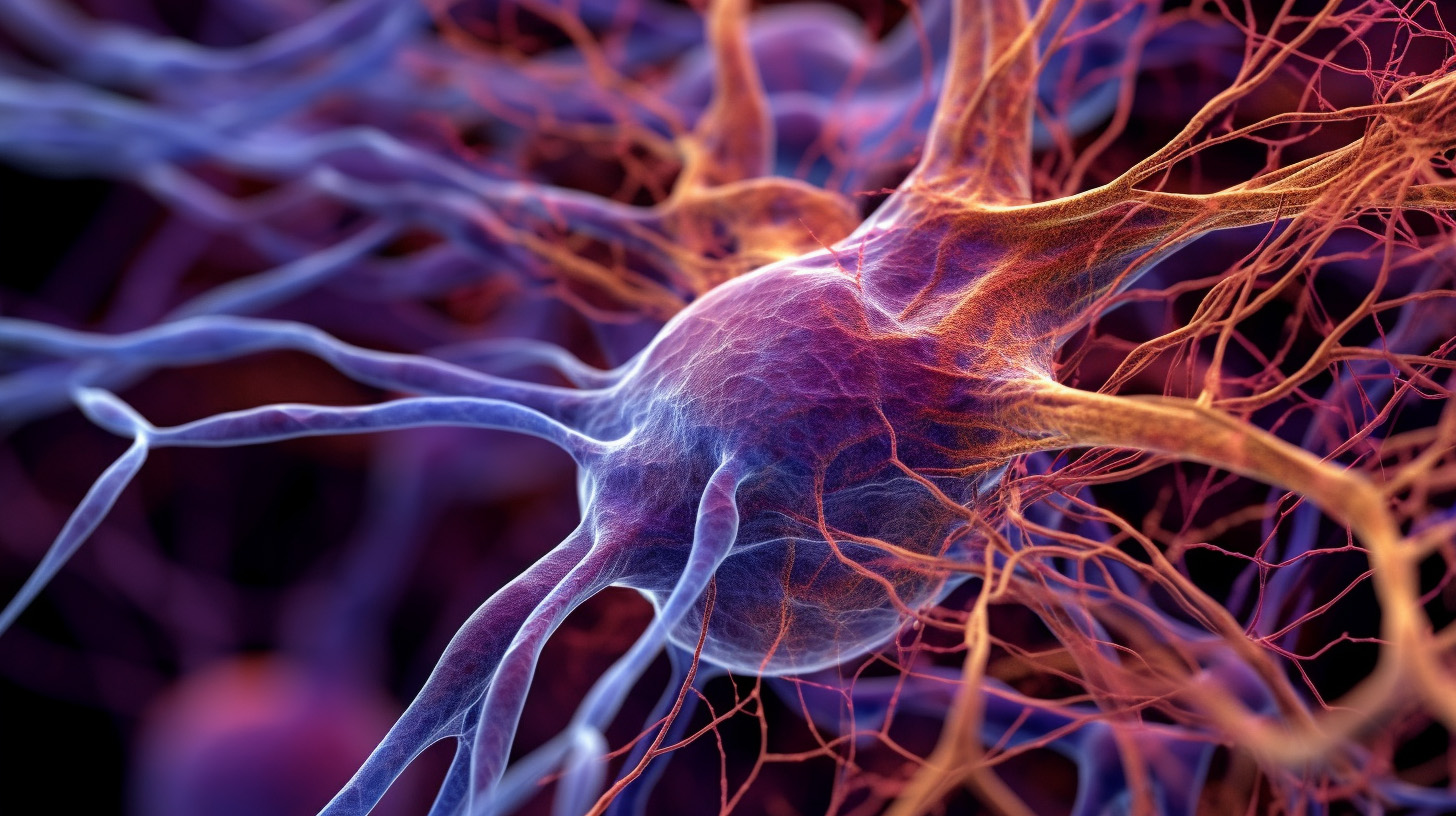TL;DR:
- Lion’s Mane Mushroom has been used in traditional Chinese and Japanese medicine for centuries to treat gastrointestinal disorders.
- Active compounds in Lion’s Mane Mushroom, including polysaccharides, hericenones, and erinacines, have been linked to various health benefits such as cognitive enhancement, nerve regeneration, and immune system support.
- Lion’s Mane Mushroom has potential to alleviate IBS symptoms by modulating gut microbiota and reducing inflammation.
- Recommended dosage of Lion’s Mane Mushroom extract: 500-1000 mg per day
- Possible side effects: itching, rashes, gastrointestinal discomfort.
- IBS symptoms can include constipation, diarrhea, abdominal pain, and rectal tenesmus, often triggered by certain foods, hormonal changes, stress, and medications.
- Lion’s Mane Mushroom can improve gut health through prebiotic effects, immune system support, and anti-inflammatory properties.
- Lifestyle changes and management, such as avoiding trigger foods, increasing fiber intake, and regular exercise, can help manage IBS symptoms alongside Lion’s Mane Mushroom supplementation.
- Building a supportive community and seeking expert advice can improve the quality of life for IBS patients.
Are you tired of IBS dictating your life and causing endless discomfort? Unlock the hidden potential of Lion’s Mane Mushroom to experience transformative relief and revitalized gut health. This remarkable medicinal mushroom, hericium erinaceus, has been an essential remedy for centuries, and now you can uncover its unique power. Dive into our extensive journey exploring the fascinating connection between Lion’s Mane Mushroom and IBS, backed by scientific research and expert guidance. No more suffering in silence – unleash your inner lion and reclaim control over your gut health today!
What is Lion’s Mane Mushroom and How Can It Help with IBS?
Lion’s Mane Mushroom, scientifically known as Hericium erinaceus, is an edible fungus native to Asia, Europe, and North America. Renowned for its beautiful white, cascading spines, this medicinal mushroom has been utilized in traditional Chinese and Japanese medicine for centuries, primarily to treat gastrointestinal disorders (Friedman, 2015).
The real power of Lion’s Mane Mushroom lies in its active compounds, which include polysaccharides, hericenones, and erinacines. These bioactive elements have been linked to various health benefits, such as cognitive enhancement, nerve regeneration, and immune system support (Liu et al., 2015).
One of the lesser-known advantages of Lion’s Mane Mushroom is its potential to alleviate symptoms associated with Irritable Bowel Syndrome (IBS). By modulating gut microbiota and reducing inflammation, Lion’s Mane helps restore the natural balance within the gastrointestinal tract, offering IBS sufferers much-needed relief.
Though research on Lion’s Mane and IBS is limited, a study published in the journal Food Science and Human Wellness found that administration of mushroom extracts potentially alleviates symptoms of IBS, making it a promising natural remedy for IBS relief (Fragkoulis et al., 2020).
When it comes to the safety and dosage of Lion’s Mane Mushroom, experts recommend starting with a daily dose of 500-1000 mg per day of extract, though individual responses may vary. Always consult a healthcare practitioner before starting any new supplement, especially if you are pregnant, nursing, or have a pre-existing medical condition.
Though Lion’s Mane is generally considered safe, some users may experience mild side effects, such as itching, rashes, or gastrointestinal discomfort. If you are allergic to other fungi, you may also be sensitive to Lion’s Mane Mushroom. However, for the majority of people, this natural remedy can provide significant relief from IBS symptoms while improving overall gut health.
In conclusion, Lion’s Mane Mushroom is a natural remedy worth considering for those suffering from IBS. Its traditional use, active compounds, and potential to improve gastrointestinal health make it an attractive option for those seeking a natural approach to IBS relief.
References
Fragkoulis, P., Chrysovalantou, M., Ioannou, D., Koukkou, E., & Ofrydopoulou, A. (2020). Evaluation of the ameliorating effects of extracts from edible fungi on the gut microbiota under oxidative stress and inflammatory response in vitro. Food Science and Human Wellness, 9(4), 372-380.
Friedman, M. (2015). Chemistry, nutrition, and health-promoting properties of Hericium erinaceus (Lion’s mane) mushroom fruiting bodies and mycelia and their bioactive compounds. Journal of agricultural and food chemistry, 63(32), 7108-7123.
Liu, J., Du, C., Wang, Y., & Yu, Z. (2015). Anti-fatigue activities of polysaccharides extracted from Hericium erinaceus. Experimental and therapeutic medicine, 9(2), 483-487.
Understanding IBS and Its Symptoms
Irritable bowel syndrome (IBS) is a common functional gastrointestinal disorder characterized by chronic and recurrent gastrointestinal pain, abdominal discomfort, constipation, diarrhea, bloating, and gas. The condition affects the large intestine and is classified into three main types: IBS with predominant constipation (IBS-C), IBS with predominant diarrhea (IBS-D), and mixed IBS (IBS-M) with alternating constipation and diarrhea (Drossman, 2006).
Some common IBS symptoms include constipation, diarrhea, abdominal pain, and rectal tenesmus (the feeling of needing to have a bowel movement even when your bowels are empty). IBS triggers can vary from person to person but may include certain foods, hormonal changes, stress, and medications.
IBS affects the digestive system by causing irregular contractions of the intestines, leading to abdominal pain, cramping, and changes in bowel habits. The exact cause of IBS is still unknown, but researchers believe factors like gut-brain interaction, inflammation, and gut microbiome imbalances may play a role in its development (Ohman & Simrén, 2010).
One often overlooked aspect of IBS is its impact on mental health. Living with IBS can lead to feelings of embarrassment, anxiety, and depression due to the unpredictable nature of the condition and the stigma surrounding bowel issues. Additionally, stress and anxiety can exacerbate IBS symptoms, creating a vicious cycle (Vivinus-Nébot et al., 2014).
By understanding IBS, its symptoms, and triggers, individuals suffering from this condition can better manage it and work towards improving their overall quality of life.
References:
- Drossman, D. A. (2006). The functional gastrointestinal disorders and the Rome III process. Gastroenterology, 130(5), 1377-1390.
- Ohman, L., & Simrén, M. (2010). Pathogenesis of IBS: role of inflammation, immunity and neuroimmune interactions. Nature reviews Gastroenterology & hepatology, 7(3), 163-173.
- Vivinus-Nébot, M., Dainese, R., Anty, R., Saint-Paul, M. C., Nano, J. L., Gonthier, N., … & Piche, T. (2014). Combination of allergic factors can worsen diarrheic irritable bowel syndrome: role of barrier defects and mast cells. The American Journal of Gastroenterology, 109(2), 270-279.
The Connection Between Lion’s Mane Mushroom and Gut Health
As someone passionate about health, you might’ve wondered, “Does Lion’s Mane mushroom help gut health?”. The answer is a resounding yes! The gut microbiome plays a critical role in overall health, and Lion’s Mane Mushroom is a powerful ally in maintaining our gastrointestinal system (Shang et al., 2020).
Let’s explore the prebiotic properties of Lion’s Mane Mushroom. Prebiotics help improve the gut flora by providing nutrients that promote the growth of beneficial bacteria, leading to better digestive health and intestinal functioning (Kao et al., 2019). Lion’s Mane Mushroom possesses prebiotic effects, making it an outstanding resource for improving gut flora (Shang et al., 2020).
Moreover, Lion’s Mane Mushroom provides immune system support. Research suggests that this mushroom can modulate the immune response, positively impacting the gut-associated lymphoid tissue (GALT) responsible for defending our bodies against pathogenic invaders (Shang et al., 2020). By supporting our immune system, Lion’s Mane Mushroom keeps our gut health in check.
Now that you understand how this remarkable mushroom can promote healthy digestion, let’s discuss the scientific studies that support its role in gut health. One study found that Lion’s Mane Mushroom extract could reduce inflammation and improve the intestinal barrier’s integrity (Shang et al., 2020). Another study revealed its capability to promote the growth of gut-friendly bacteria, enhancing the overall gut ecosystem (Kao et al., 2019).
Lion’s Mane Mushroom is a potent ally in maintaining and improving gut health. By supporting the gut microbiome, possessing prebiotic effects, and providing immune system support, this mushroom is genuinely a digestive health superhero. With the backing of scientific studies, you can confidently incorporate this amazing fungus into your journey towards improved gut health and IBS relief. So, take a step towards a healthier you by unlocking the power that Lion’s Mane Mushroom offers!
References:
Kao, C. H., Wang, H. Y., Ng, C. C., Chen, C. Y., & Chiu, H. W. (2019). Bioactive molecules derived from Hericium erinaceus mycelium ameliorate indomethacin-induced intestinal barrier dysfunction and adapt the fecal microbiota composition. Applied Microbiology and Biotechnology, 103(24), 9921-9930.
Shang, X., Lin, K., Yu, R., & Li, P. (2020). Lion’s Mane Medicinal Mushroom, Hericium erinaceus (Agaricomycetes), Modulates Purinoceptor-Coupled Calcium Signaling Pathways in Pheochromocytoma (PC12) Cells. International Journal of Medicinal Mushrooms, 22(2), 147-155.
Managing and Reducing IBS Flare-Ups with Lion’s Mane Mushroom
Lion’s Mane Mushroom (Hericium erinaceus) has become increasingly popular as a natural remedy for IBS relief due to its anti-inflammatory properties (Zhang et al., 2016). The potent compounds of this medicinal mushroom can help alleviate common digestive issues, soothe an irritated bowel, and contribute to IBS management, ultimately bringing a significant improvement in your overall quality of life.
What is Lion’s Mane Mushroom’s anti-inflammatory role and properties of IBS relief
IBS flare-ups often involve inflammation, leading to gastrointestinal pain and discomfort. Lion’s Mane Mushroom has demonstrated exceptional anti-inflammatory properties, which can help reduce inflammation in the gastrointestinal tract and alleviate IBS symptoms (Zhang et al., 2016).
How Lion’s Mane Mushroom alleviates common digestive issues
Lion’s Mane Mushroom may help to alleviate digestive issues associated with IBS by promoting the production of beneficial gut bacteria and enhancing intestinal barrier function, which can result in reduced gut inflammation and improved digestion (Diling et al., 2017). This could lead to a reduction in symptoms like bloating, constipation, and diarrhea.
The low FODMAP diet and Lion’s Mane Mushroom
A low FODMAP diet is often advised for IBS sufferers to help manage symptoms, as it avoids foods that can trigger flare-ups. Fortunately, Lion’s Mane Mushroom is considered low FODMAP, meaning it’s safe for most people with IBS to consume without causing further digestive issues. However, it is essential to remember that everyone’s sensitivities are unique, and it’s crucial to monitor your body’s response to this supplement carefully.
Tips for using Lion’s Mane Mushroom as part of an IBS management plan
When incorporating Lion’s Mane Mushroom into your IBS management plan, consider the following tips:
- Start with a small dose of Lion’s Mane Mushroom to assess your body’s response and gradually increase the dosage as tolerated.
- Choose a high-quality Lion’s Mane Mushroom supplement from a trusted source to ensure its purity and safety.
- Combine Lion’s Mane Mushroom with other natural remedies, such as peppermint oil and ginger extract, to maximize the benefits of your IBS management plan.
- Keep a symptom diary to document how your body is responding to Lion’s Mane Mushroom and inform future adjustments in dosage or supplement type.
Other natural remedies to reduce IBS flare-ups
Aside from Lion’s Mane Mushroom, other natural remedies to consider for reducing IBS flare-ups include:
- Peppermint oil: It can effectively relieve IBS symptoms like abdominal pain and bloating (Khanna et al., 2014).
- Ginger: This has been shown to reduce gastrointestinal symptoms, including nausea and abdominal discomfort (Hu et al., 2011).
- Probiotics: It can help restore the balance of gut bacteria and improve IBS symptoms (Ford et al., 2014).
Remember to consult with your healthcare provider before starting any supplementation, especially if you have pre-existing medical conditions or are taking medications.
References:
Diling, C., Xin, Y., Chaoqun, Z., Tiande, Z., Ou, S., Yizhen, X., & Jian, Y. (2017). Extracts from Hericium erinaceus relieve inflammatory bowel disease by regulating immunity and gut microbiota. Oncotarget, 8(49), 85838-85857.
Ford, A. C., Quigley, E. M., Lacy, B. E., Lembo, A. J., Saito, Y. A., Schiller, L. R., … & Moayyedi, P. (2014). Efficacy of prebiotics, probiotics, and synbiotics in irritable bowel syndrome and chronic idiopathic constipation: systematic review and meta-analysis. The American journal of gastroenterology, 109(10), 1547.
Hu, M. L., Rayner, C. K., Wu, K. L., Chuah, S. K., Tai, W. C., Chou, Y. P., … & Hu, T. H. (2011). Effect of ginger on gastric motility and symptoms of functional dyspepsia. World journal of gastroenterology, 17(1), 105.
Khanna, R., MacDonald, J. K., & Levesque, B. G. (2014). Peppermint oil for the treatment of irritable bowel syndrome: a systematic review and meta-analysis. Journal of Clinical Gastroenterology, 48(6), 505-512.
Zhang, J., An, S., Hu, W., Teng, M., Wang, X., Qu, Y., … & Wang, D. (2016). The neuroprotective properties of Hericium erinaceus in glutamate-damaged differentiated PC12 cells and an Alzheimer’s disease mouse model. International journal of molecular sciences, 17(11), 1810.
Dietary and Lifestyle Changes for IBS Management
The journey to relieve and manage IBS symptoms starts with making essential dietary and lifestyle changes. Implementing these adjustments can significantly improve the quality of life for IBS sufferers, enabling them to unlock the power of Lion’s Mane Mushroom and other beneficial supplements (Chey et al., 2015).
Importance of dietary management in IBS treatment
Dietary management plays a crucial role in IBS treatment. A well-balanced, IBS-friendly diet can help reduce gastrointestinal symptoms like bloating, abdominal pain, and irregular bowel movements. Identifying and avoiding trigger foods is vital to attaining symptom relief.
Identifying and avoiding trigger foods
Common food triggers for IBS include high-fat foods, dairy products, alcohol, caffeine, and carbonated drinks with high fructose corn syrup. Keeping a food diary is an effective way to recognize what foods exacerbate IBS symptoms (Spiller, 2008). Eliminate these triggers from your diet for improved gut health.
How fiber intake affects IBS symptoms
Fiber intake is critical in managing IBS symptoms. Soluble fiber can help regulate bowel movements and alleviate constipation, while insoluble fiber may increase the frequency and severity of diarrhea. Gradually increasing fiber intake and monitoring symptoms is essential to determine the optimal daily fiber amount for your body (Eswaran et al., 2013).
The role of exercise in managing IBS
Regular exercise is beneficial in improving IBS symptoms. Engaging in physical activities such as walking, swimming, and yoga can help reduce stress, enhance bowel muscle contractions, and promote overall gut health. Find a routine that works best for your body and lifestyle to maintain a healthy, active life (Johannesson et al., 2011).
Lifestyle modification recommendations for IBS sufferers
Lifestyle changes can significantly impact IBS symptom management and overall wellbeing. Consider reducing stress through meditation, relaxation techniques, improving sleep quality, and seeking support from friends, family, or online communities like the Lions Mane Supplements Facebook Group to nurture a holistic approach to your IBS treatment plan.
Remember, the journey to improved gut health starts with optimizing your dietary and lifestyle choices. Embrace these changes to unlock the power of Lion’s Mane Mushroom and take control of your IBS symptoms today.
References:
Chey, W. D., Kurlander, J., & Eswaran, S. (2015). Irritable Bowel Syndrome: A Clinical Review. JAMA, 313(9), 949–958.
Eswaran, S., Muir, J., & Chey, W. D. (2013). Fiber and functional gastrointestinal disorders. The American Journal of Gastroenterology, 108(5), 718–727.
Johannesson, E., Simrén, M., Strid, H., Bajor, A., & Sadik, R. (2011). Physical activity improves symptoms in irritable bowel syndrome: a randomized controlled trial. The American journal of gastroenterology, 106(5), 915–922.
Spiller, R. (2008). How do FODMAPs worsen symptoms of irritable bowel syndrome? British Journal of Nutrition, 100(5), 941–943.
Building a Supportive Community for IBS Patients
Living with Irritable Bowel Syndrome (IBS) can be a challenging experience, but finding an empathetic and knowledgeable community can make a world of difference in improving your quality of life. Let’s explore how online forums, social media, and support groups can offer valuable resources, help you manage IBS symptoms, and ultimately enhance your overall wellbeing.
How Online Forums and Social Media Can Provide IBS Support
Online platforms such as Reddit and Facebook Groups allow IBS sufferers to connect with others experiencing similar issues. These forums offer an opportunity to share personal experiences, tips, and advice for coping with IBS symptoms. They also give a sense of camaraderie, reminding you that you’re not alone in your journey to improving gut health.
Benefits of Joining IBS Support Groups
IBS support groups offer emotional encouragement, as well as practical advice for managing symptoms. They create a safe space for discussing sensitive topics, allowing members to openly express their concerns and frustrations. Support groups not only provide valuable information but also foster a sense of belonging, which can be crucial in coping with a chronic condition like IBS.
One potential resource is the International Foundation for Gastrointestinal Disorders, which offers both online and in-person IBS support groups1-2.
IBS Patient Education Resources
Educating yourself about IBS and available treatment options is an essential part of effective symptom management. Numerous resources are available online to help educate IBS patients, including webinars, podcasts, articles, and research studies. Reputable sources are imperative to ensure the information you consume is accurate and evidence-based.
Expert Advice for Living with IBS
Receiving expert advice from healthcare professionals is vital in managing IBS. Doctors and dietitians can help you with proper diagnostics and creating personalized treatment plans. Incorporating natural remedies, such as Lion’s Mane mushroom, alongside conventional treatments may provide additional symptom relief. Consult your healthcare provider before starting any new supplement.
How a Supportive Community Can Improve the Quality of Life for IBS Patients
Building a supportive community can significantly improve your IBS journey. Online forums, social media, and support groups can provide valuable information and emotional support. Additionally, equipping yourself with expert advice and IBS patient education resources can be instrumental in managing symptoms, ultimately enhancing your overall quality of life.
References:
- About IBS. (n.d.). International Foundation for Gastrointestinal Disorders. Retrieved January 30, 2022, from https://www.aboutibs.org/
- IBS Support Groups. (n.d.). International Foundation for Gastrointestinal Disorders. Retrieved January 30, 2022, from https://aboutibs.org/ibs-support-groups-starting-a-personal-support-group/
- Wang, M., Gao, Y., Xu, D., & Gao, Q. (2014). A polysaccharide from cultured mycelium of Hericium erinaceus and its anti-chronic atrophic gastritis activity. Carbohydrate Polymers, 112, 131-137. doi:10.1016/j.carbpol.2014.05.081
##Conclusion
In conclusion, incorporating Lion’s Mane Mushroom into your diet can have a positive impact on your IBS symptoms. As highlighted in this blog post, Lion’s Mane Mushroom can alleviate common digestive issues, soothe irritated bowels, and reduce IBS flare-ups. By making dietary and lifestyle adjustments, such as avoiding trigger foods and increasing fiber intake, you can effectively manage your IBS. Joining supportive communities, seeking expert advice, and connecting with like-minded individuals can improve your quality of life as an IBS patient. So don’t wait, take control of your health and add Lion’s Mane Supplements to your IBS management plan today!



